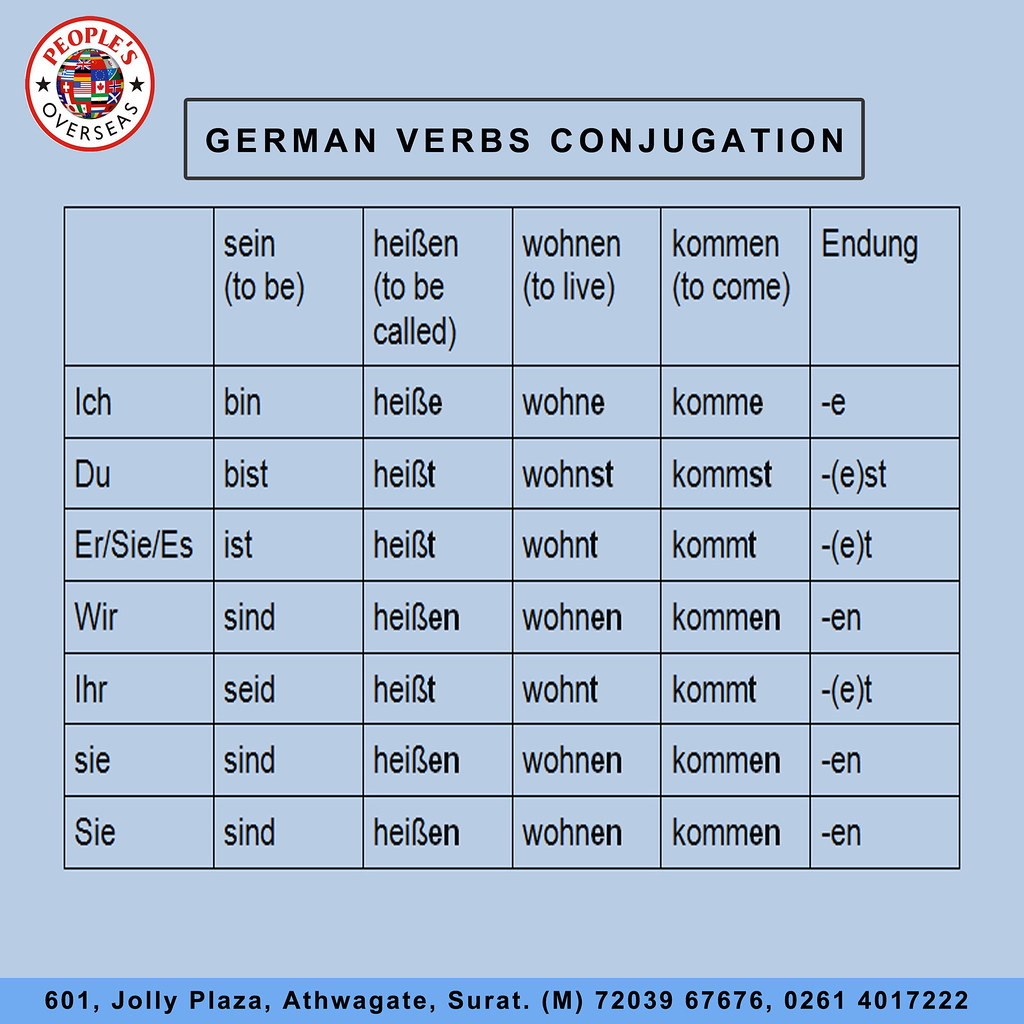Conjugation of to be in german
Again, this is something you will simply have to learn by heart…. Ich bin mir nicht sicher, wann am Montag die Schule beginnt. Bist du auch am Freitag mit dabei? Wir waren uns nicht sicher, oben eine gute Idee ist.
Even if you never wanted to quote Hamlet's famous soliloquy in German " Sein oder nicht sein " , the verb sein is one of the first verbs you should learn and one of the most useful. Think of how often you use the phrase "I am" in English, and you'll get the idea. As in most languages, the verb "to be" is one of the oldest verbs in German, and therefore one of the most irregular. Here's the scoop on the verb sein and how to conjugate it in all the different ways. Simple past tense - Imperfekt. Note: The future tense, especially with "sein," is used much less in German than in English. Very often the present tense is used with an adverb instead.
Conjugation of to be in german
April 19, Author. Marie Schmoll. Conjugation is a grammatical term that describes how verbs change to show different tenses, moods, or persons. When you conjugate a verb, you are changing its form. To conjugate a regular verb, you take the stem of the verb and add the appropriate ending. This is how the regular verb "spielen" to play changes in the present, according to genus which gender and numerus how many :. So we made a table for each tense. The present tense is arguably the most important one. In German, the simple past tense is used to talk about events that happened in the past and are now completed. The Present Perfect is used to describe actions or events in the past that have a connection to the present. It's also formed with the past participle of the main verb and the auxiliary verbs of " haben " to have or " sein " to be , but this time in the past tense:. This brings you back in time even further than the simple past. To form this tense, you need the auxiliary verb " werden " to become again, followed by the past participle of the main verb:.
Ready to Get Unstuck Learning German? Take your German to the next level.
Conjugate more than 23, regular and irregular German verbs. The conjugation of verbs shows you all finite and infinite forms in a verb table. To display all tenses, grammar and meanings , simply enter a verb or verb form in the input field of the conjugator. I have a car, a wife and two kids. The individual verb forms are shown as a table. For a quick orientation, the table first shows an overview with all essential conjugation features of the verb: irregular or regular, possible auxiliary verbs and details of the separability. In addition, the basic forms are listed, in which you can recognizes all these features.
Finally understand hard-to-grasp German grammar concepts. Learning all of this is a big task for almost every German learner. And in order to understand nominative case [i. When we intersect this information on Y and X axes, we get these ultra-familiar English subject pronouns:. This woman is a [female] doctor. Diese Frau ist reich.
Conjugation of to be in german
In German, you can type in and conjugate infinitive forms such as " machen ", " sammeln ", The conjugator recognizes reflexive verbs " sich rasieren " and negative forms " nicht machen " , as well as verbs with separable or inseparable prefixes e. The conjugator uses conjugation rules for models. You can click on the corresponding section to learn more. The info and tips section provides information about the primary conjugation rules for German verbs, grammatical information about how they are used and what meanings they can express.
Nikon lanyard
Then I would be happy. Then you would be doctors. Sie sind angekommen. Ich bin schwimmen gegangen, Ich bin nach Berlin gefahren. Continue learning for free. Fangen wir an! Create profiles for personalised advertising. Der Die Das. To display all tenses, grammar and meanings , simply enter a verb or verb form in the input field of the conjugator. Berlitz USA.
April 19, Author. Marie Schmoll. Conjugation is a grammatical term that describes how verbs change to show different tenses, moods, or persons.
The books were cheap. Share this Facebook Twitter Linkedin. Wie war es? You had been loud pl. One says it was cold outside. Are you tired? Conjugation is a little bit like time travel. The conjugator recognizes reflexive verbs " sich rasieren " and negative forms " nicht machen " , as well as verbs with separable or inseparable prefixes e. Noun Plurals. One says they were thieves. The Subjunctive II is based on the simple past tense Imperfekt. Examples E. Wir sind gesund. We have been broke.


0 thoughts on “Conjugation of to be in german”